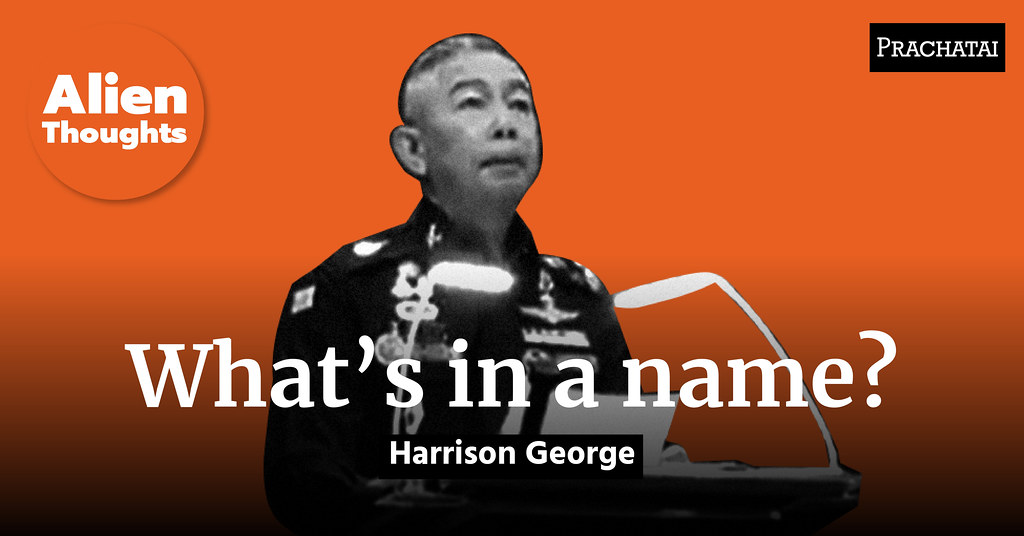‘A rose by any other name would smell as sweet.’
William Shakespeare, Romeo and Juliet, Act 2, Scene 2

The official responses to the tragic mass shooting in Nakhon Ratchasima were almost laughably contradictory, so the Bangkok Post could run the headline ‘Poor security worsened toll: PM’ while the Guardian had ‘Thai PM defends security at military base after soldier's killing spree’. And neither was wrong.
But scholars of what, for want of a better term, I will call military thinking might take a few moments to ponder one phrase by Army Commander-in-Chief Gen Apirat Kongsompong:
‘The moment he pulled the trigger he became a criminal, not a soldier anymore.’
It is not really important to point out that the weepy-eyed General’s statement has the legal weight of a snowflake at Songkran. For heaven’s sake, for 4 years the military junta was frog-marching everyone they didn’t like into their own courts so they could be dealt with by the travesty known as military justice. But as soon as one of their own goes terminally ballistic, they suddenly don’t want to know.
Nor should we dwell too long on the fact that, if the General’s definition is valid, there are lots of ‘criminal non-soldiers’ in the current ranks of the military who have been recorded pulling triggers on civilians, not least among them Gen Apirat himself.
What is perhaps more revealing is the importance the military give to labelling people in line with their simple-minded classification of humankind. This is at one with the ideology that sees a clear ‘good person/bad person’ dichotomy that reactionaries find so useful at election time.
Apirat’s preferred definition of ‘soldier’ must run something along the lines of ‘warrior hero defending monarchy, religions and nation’ (with suitable martial music in the background, of course, but you’ll have to imagine that yourself). Hard to reconcile this with the shooting spree en route to and inside Terminal 21 in Khorat.
But the military establishment does not want to be seen as guilty by association with Jakrapanth’s actions, even as they are busily destroying all historical commemorations of those who did actually defend the country against the Boworadej Rebellion
But is it not a bit strange that Jakrapanth’s automatic self-disqualification from the military only stems from shooting? What about the proximate cause of his bullet-riddled blowout, a shady business deal turned sour involving his commanding officer?
Business dealings, shady or otherwise, are not in the JD of any military rank, as far as I know. But the boardrooms of Thai businesses are full of ‘people in uniform’ wearing suits as a disguise. Apirat himself is on the board of TMB Bank and has been on the board of Bangchak Petroleum. Pol Gen Somyot Poompunmuang, now retired and in his second term as the head of that pillar of financial probity, the Football Association of Thailand, once astounded even his own top brass by declaring that his responsibilities as Commissioner-General the Royal Thai Police were just a sideline from his day job of playing the stock exchange.
The soldiers’ definition is what constitutes proper soldier behaviour is obviously a very fluid concept. What is much clearer to them is the need for a difference, a gap, a yawning chasm, between ‘us’ and ‘them’.
Apirat’s summary dismissal of Jakrapanth from the Army is a classic example of ‘othering’, declaring someone to be not one of us, the ‘other’, one of the unwanted, the enemy.
In much the same way, my browsing of 100-year-old literature from and after World War 1 (hey, it’s all free on Project Gutenberg and lots of it) reveals some authors seemingly unable to bring themselves to use the word ‘German,’ which for lots of people at the time was associated with Beethoven, Goethe and Dürer.
Instead they used ‘Hun’ or ‘Boche’ or ‘Kraut’. That’s among the writers who mostly stayed away from the actual fighting, of course. The first-hand accounts of the horror of trench warfare (and I strongly recommend Henri Barbusse) are far less interested in such infantile Trumpian name-calling.
Apirat’s insistence on creating opponents of anyone who doesn’t think like him (remember his hybrid warfare rant?) stands in stark contrast to what happened after another mass shooting.
When an Australian white supremacist killed 51 people in attacks on 2 mosques in Christchurch, New Zealand, almost a year ago, the opportunity for othering the victims was huge. They belonged to a minority religion; many were not citizens.
NZ PM Jacinda Ardern immediately identified the victims with New Zealand. They had come here to call this place their home, she said. They had the same right as everyone else in the country to expect protection from violence. They were not ‘them’; they were ‘us’.
Jakrapanth is also one of ‘us’.
This does not mean condoning in any way what he did. But he spent his adult life in one of the most unequal institutions in a grossly unequal society. He seems to have subscribed to the military’s nod-and-a-wink code of conduct regarding extracurricular income-earning. The Army agrees that he had a legitimate grievance and had been cheated in a way that gave him no means of recourse.
But to cast him arbitrarily out of the tribe, labelling him a ‘rogue’ soldier, gets us nowhere.
A rogue by any other name would smell as bad.
Prachatai English is an independent, non-profit news outlet committed to covering underreported issues in Thailand, especially about democratization and human rights, despite pressure from the authorities. Your support will ensure that we stay a professional media source and be able to meet the challenges and deliver in-depth reporting.
• Simple steps to support Prachatai English
1. Bank transfer to account “โครงการหนังสือพิมพ์อินเทอร์เน็ต ประชาไท” or “Prachatai Online Newspaper” 091-0-21689-4, Krungthai Bank
2. Or, Transfer money via Paypal, to e-mail address: [email protected], please leave a comment on the transaction as “For Prachatai English”
